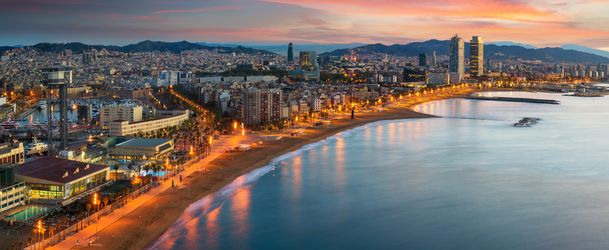Living in Spain for 6 months with a winter rental

Why do so many people move to Spain for 6 months a year?
Autumn and winter in continental Europe can be grim. It’s cold, it often rains, the days are short. So short that we sometimes wake up in total darkness in the morning, and, by the time the working day is over it’s dark again, leaving us with few more options to cheer up than Netflix and hot chocolate. Spring will soon come, but it’s undeniable that several consecutive months of bad weather can take a toll even on the toughest spirits. Weather is one of the main reasons why every year more and more inhabitants of Europe’s colder regions decide to migrate to warmer climates during the winter. More in specific, an increasing number of people opts for living in Spain for six months a year, attracted by the warmer weather of the Mediterranean basin.
Beach time in the winter
Spain, especially its southern coast, benefits from a temperate climate mitigated by the Mediterranean Sea. In many regions, such as Andalusia, Murcia, Valencia, and Catalonia, the temperature hardly ever falls below 10° C during the colder months of January and February. Flowers are constantly in bloom, people are out in the streets, and the days are a bit longer. On warmer days, it is not rare to see people basking in the sun at the beach; no wonder why whoever is in the position to move to live in Spain for six months a year would give it a serious thought.
Living in Spain for 6 months a year: does it suit me?
Moving to Spain for the winter months is an ideal solution for pensioners, digital nomads, freelancers, and anyone else who is not confined - for work or other crucial duties - to one particular place. It can enormously improve the quality of life of whoever has sufficient mobility and funds to go abroad. The weather is good, the local population is warm and hospitable, the food is great, and the cost of living isn’t prohibitive. Furthermore, Spain is well acquainted with this type of immigration; hence it’s relatively easy to find mid-term apartment rentals and other services dedicated to making the life of foreigners in the country easier.
Which are the best areas to live in Spain for the winter?
If you are planning to move to Spain for something like six months during the winter, the best areas are the ones on the Mediterranean coast of the peninsula. They are by far the sunniest and warmest regions, with promising names such as Costa del Sol (which translates to Sunny Coast) near Malaga; Costa Tropical (Tropical Coast) near Granada; Costa Calida (Warm Coast) near Murcia; and Costa Blanca near Alicante. Costa de Valencia (Valencia’s Coast) is an excellent option as well.
Another very popular destination for a warmer winter is the Canary Islands, an autonomous region of Spain composed of seven tiny islands located a mere 100 kilometres off the African coast, in front of the southernmost border between Morocco and Western Sahara. The two most popular islands of the Canaries are Tenerife and Gran Canaria; for years they’ve been a favourite among British and northern Europeans who move to Spain for the winter. The Canary Islands benefit from a unique micro-climate, famous in Europe since the Victorian era for its therapeutic properties. This granted them the epithet “Islands of eternal spring”.
In the Canary Islands life flows with a slow pace, and the cost of living is among the lowest in Europe. The residents like to spend time outdoors enjoying the amazing weather, the ocean, and the Islands’ natural wonders. Mount Teide, located on Tenerife, is the highest elevation in Spain (while being overseas, the Canary Islands belong politically to mainland Spain), and the country’s most visited National Park.
How do I move to live in Spain for six months a year?
After evaluating whether you can move to live in Spain for six months, you’ll have to choose where to move and then search for accommodation. On top of the amazing weather, the warmest regions in Spain have yet another advantage. They are touristic areas, typically flooded with tourists from all over the country during the summer, but much quieter during the winter. A lot of property managers and owners have to cope with the seasonality of their investments, which are profitable during the summer months when the touristic season peaks, but are left empty the rest of the year.
Winter rentals in Spain: off-season holiday apartments
These apartments are perfect for those who want to spend their time in Spain during the winter. They might be expensive in high season, but become much cheaper during the winter. After taking contacts through dedicated web portals and estate agencies with the winter rental apartments you like, you’ll have to agree on a price. Based on a six-month winter rental, you will be able to find more than one interesting deal.
In the Canary Islands for example, which are among the most sought-after destinations for moving in Spain during the winter, you could find a decent 60 sqm apartment not far from the beach for €600 to €800 a month - this is if you avoid the islands’ most touristic areas. In other regions - on the Mediterranean coast of Spain - you might find even cheaper winter rentals. The apartments are usually fully furnished, and they will need little or no adjustment to suit your needs.
The first time you will be living in Spain for the winter you will have to spend a little more time finding the right winter rental villa or apartment, but, once you’ll find it, you could establish with the property owners a long term winter rental agreement for an appropriate number of years. This way, you will always have a solid base to spend the winter in Spain.